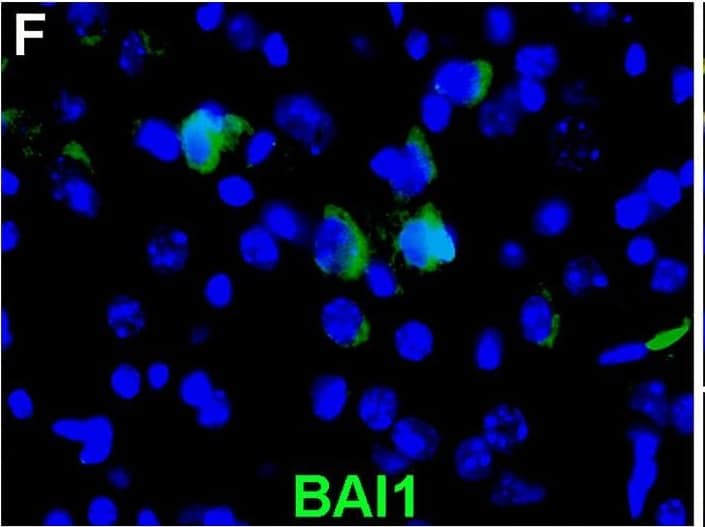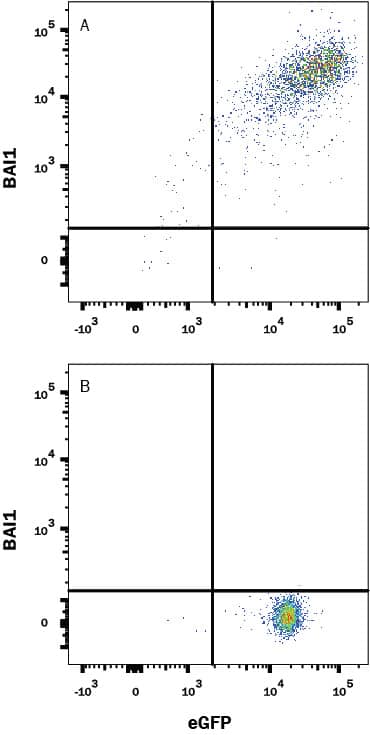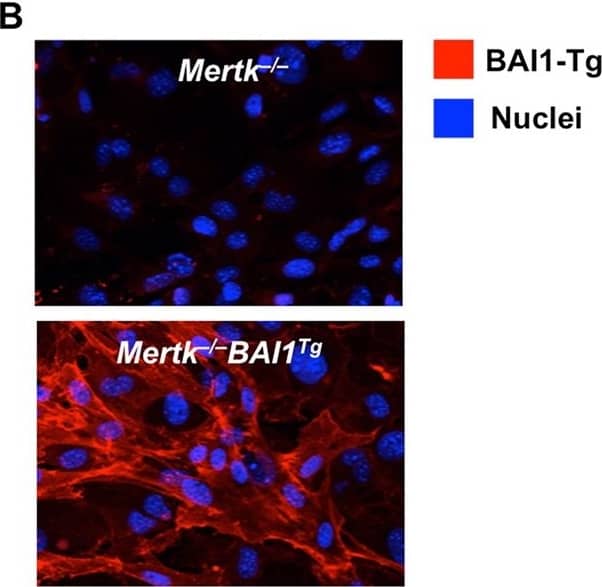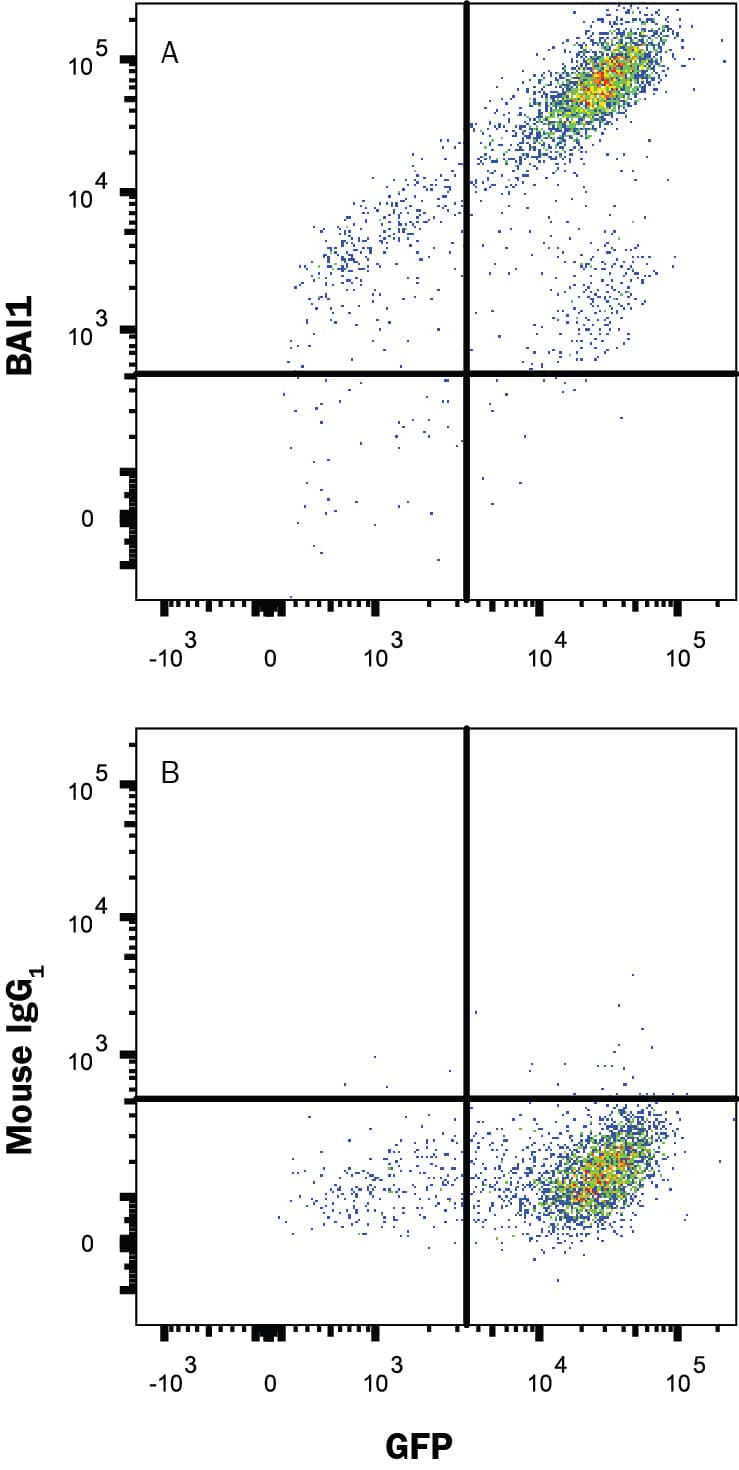BAI1 Products
Brain Angiogenesis Inhibitor 1 (BAI1) is a 170 kDa 7-transmembrane domain G protein-coupled receptor (GPCR) that has a large N-terminal extracellular region with an RGD motif, five thrombospondin type I repeats, and a juxtamembrane GPS (GPCR proteolytic cleavage site). Within the extracellular domain (ECD) up to the GPS (amino acids 31-879), mature human BAI1 shares 94% amino acid sequence identity with mouse and rat BAI1. BAI1 is preferentially expressed on brain neurons but also is found on astrocytes and macrophages and in the pancreas, stomach, and colon. BAI1 can be cleaved within the GPS to release a 120 kDa fragment termed Vasculostatin which corresponds to nearly the entire N-terminal ECD. Generation of additional soluble fragments suggests the cleavage of BAI1 at multiple sites. BAI1 fragments interact with Integrin alpha V beta 5 or CD36 on microvascular endothelial cells to inhibit cell proliferation and migration. Overexpression of BAI1 in glioblastoma or pancreatic adenocarcinoma cells inhibits their tumorigenicity and the development of tumor-associated neovascularization. Fragments of the ECD, including Vasculostatin, also suppress in vivo angiogenesis and tumor growth. BAI1 is down-regulated in glioblastoma, carcinomas of the pancreas, colon, and stomach and also in experimental ischemia. Its expression is inversely correlated with tumor vascularity in colorectal and pulmonary carcinomas. On macrophages and astrocytes, BAI1 mediates the phagocytosis of apoptotic cells through recognition of cell surface phosphatidylserine.
96 results for "BAI1" in Products
96 results for "BAI1" in Products
BAI1 Products
Brain Angiogenesis Inhibitor 1 (BAI1) is a 170 kDa 7-transmembrane domain G protein-coupled receptor (GPCR) that has a large N-terminal extracellular region with an RGD motif, five thrombospondin type I repeats, and a juxtamembrane GPS (GPCR proteolytic cleavage site). Within the extracellular domain (ECD) up to the GPS (amino acids 31-879), mature human BAI1 shares 94% amino acid sequence identity with mouse and rat BAI1. BAI1 is preferentially expressed on brain neurons but also is found on astrocytes and macrophages and in the pancreas, stomach, and colon. BAI1 can be cleaved within the GPS to release a 120 kDa fragment termed Vasculostatin which corresponds to nearly the entire N-terminal ECD. Generation of additional soluble fragments suggests the cleavage of BAI1 at multiple sites. BAI1 fragments interact with Integrin alpha V beta 5 or CD36 on microvascular endothelial cells to inhibit cell proliferation and migration. Overexpression of BAI1 in glioblastoma or pancreatic adenocarcinoma cells inhibits their tumorigenicity and the development of tumor-associated neovascularization. Fragments of the ECD, including Vasculostatin, also suppress in vivo angiogenesis and tumor growth. BAI1 is down-regulated in glioblastoma, carcinomas of the pancreas, colon, and stomach and also in experimental ischemia. Its expression is inversely correlated with tumor vascularity in colorectal and pulmonary carcinomas. On macrophages and astrocytes, BAI1 mediates the phagocytosis of apoptotic cells through recognition of cell surface phosphatidylserine.
| Reactivity: | Human, Mouse |
| Details: | Rabbit IgG Polyclonal |
| Applications: | IHC, WB, ICC/IF |
| Reactivity: | Human |
| Details: | Mouse IgG1 Monoclonal Clone #480912 |
| Applications: | Flow |
| Applications: | AC |
| Reactivity: | Human |
| Details: | Mouse IgG1 Monoclonal Clone #542515 |
| Applications: | IHC |
| Reactivity: | Human |
| Details: | Mouse IgG2a Monoclonal Clone #1019031 |
| Applications: | Flow, CyTOF-ready, ICC |
| Reactivity: | Human |
| Details: | Sheep IgG Polyclonal |
| Applications: | Neut |
| Reactivity: | Human |
| Details: | Mouse IgG1 Monoclonal Clone #480912 |
| Applications: | Flow |
| Reactivity: | Human |
| Details: | Mouse IgG1 Monoclonal Clone #480912 |
| Applications: | Flow |
| Reactivity: | Human |
| Details: | Mouse IgG1 Monoclonal Clone #480912 |
| Applications: | Flow, CyTOF-ready |
| Source: | CHO |
| Accession #: | O14514 |
| Applications: | BA |
| Reactivity: | Human |
| Details: | Mouse IgG2a Monoclonal Clone #1019031 |
| Applications: | Flow |
| Reactivity: | Human |
| Details: | Mouse IgG1 Monoclonal Clone #480912 |
| Applications: | Flow |
| Reactivity: | Human |
| Details: | Mouse IgG2a Monoclonal Clone #1019031 |
| Applications: | Flow |
| Reactivity: | Human |
| Details: | Mouse IgG1 Monoclonal Clone #480912 |
| Applications: | Flow |
| Reactivity: | Human |
| Details: | Mouse IgG2a Monoclonal Clone #1019031 |
| Applications: | Flow |
| Reactivity: | Human |
| Details: | Mouse IgG2a Monoclonal Clone #1019031 |
| Applications: | Flow |
| Reactivity: | Human |
| Details: | Mouse IgG2a Monoclonal Clone #1019031 |
| Applications: | Flow |
| Reactivity: | Human |
| Details: | Mouse IgG2a Monoclonal Clone #1019031 |
| Applications: | Flow |
| Reactivity: | Human |
| Details: | Mouse IgG1 Monoclonal Clone #480912 |
| Applications: | Flow |
| Reactivity: | Human |
| Details: | Mouse IgG1 Monoclonal Clone #480912 |
| Applications: | Flow |
| Reactivity: | Human |
| Details: | Mouse IgG2a Monoclonal Clone #1019031 |
| Applications: | Flow |
| Reactivity: | Human, Monkey, Bovine |
| Details: | Rabbit IgG Polyclonal |
| Applications: | IHC, ELISA |
| Applications: | ELISA |
| Applications: | ELISA |

![Western Blot: BAI1 Antibody [NB110-81586] Western Blot: BAI1 Antibody [NB110-81586]](https://resources.bio-techne.com/images/products/BAI1-Antibody-Western-Blot-NB110-81586-img0004.jpg)






![Immunohistochemistry-Paraffin: BAI1 Antibody - BSA Free [NB100-59011] Immunohistochemistry-Paraffin: BAI1 Antibody - BSA Free [NB100-59011]](https://resources.bio-techne.com/images/products/BAI1-Antibody---BSA-Free-Immunohistochemistry-Paraffin-NB100-59011-img0002.jpg)
![ELISA: Human BAI1 - Ready-To-Use ELISA Kit (Colorimetric) [NBP3-31150] - Human BAI1 - Ready-To-Use ELISA Kit (Colorimetric)](https://resources.bio-techne.com/images/products/nbp3-31150_human-bai1-ready-to-use-elisa-kit-colorimetric-206202415311371.png)
![ELISA: Human BAI1 ELISA Kit (Colorimetric) [NBP3-27250] -](https://resources.bio-techne.com/images/products/nbp3-27250_human-bai1-elisa-kit-colorimetric-1142024103508.png)